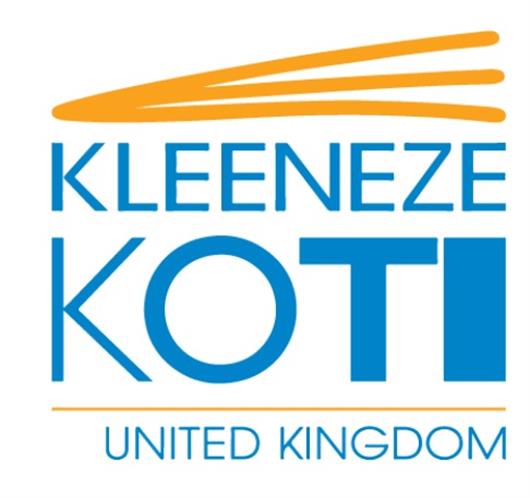 Add My Company
Add My Company
100 years of Bristol brush making

Once boldly illuminating the local skyline, the iconic red neon signage welcomed visitors to Kleeneze and the Hanham area. Whilst the neon may have long dimmed, the welcome is still as warm at Kleeneze-KOTI, a modern day descendant of the original Kleen-e-ze Brush Company founded in 1923.

After learning his trade at the Fuller Brush Company in America, founder Harry Crook, returned home to Bristol to set up the Kleen-e-ze Brush Company in May 1923. From modest beginnings under the staircase of an old furniture factory in Whitehall, he pioneered the manufacture of innovative twisted in wire brushes in this country.
In just five years, the company had branches across Britain and in August 1928, the Company relocated 3 miles away to new spacious premises in Hanham – The Home of Kleen-e-ze.

As the Company reinvented itself in both domestic and industrial markets, the Hanham site underwent continual redevelopment and modernisation. A new pavilion and sports ground was built close to the factory, whilst the original Whitehall building was presented to the Bristol 5 Boys Club in 1938.
Today, the Hanham site is still very much the home of brush making in Bristol, as Kleeneze-KOTI proudly manufactures its brush strip and sealing solutions for all aspects of industry.
Ship shape and ‘bristle’ fashion
Home to the Clifton Suspension Bridge, the SS Great Britain, Concorde, and Great Western Railway it would appear that Bristol was also home to one of the first serious centres of brush making.
Mary-le-Port Street was the hub of the brush making fraternity, with the city laying claim to 58 brush makers by 1780. The sign of a brush maker or ‘Pan-Shop’ was a large brush hung over the doorway, and this was quite a common sight in this quarter of the city.
The Bristol Society of Brush makers was formed in 1782 and having carried the industry all around the country, Bristol became headquarters to the Grand Brush makers Society. These early craftsmen ranked highly in the social scale of the time, with many becoming Burgesses of the City. It is somehow fitting, that over 150 years later, a Bristolian, Harry Crook, founder of The Kleeneze Brush Company, the most recognised name in brush making history, himself became a benefactor and Mayor of the City of Bristol.

A name with a meaning
In its early years, Kleeneze was exclusively a brush manufacturer, building its reputation with innovative household twisted in wire brushes. Kleeneze representatives, or ‘boosters’ as they were known, became common sight on doorsteps of Britain and laid the Company’s foundation of quality, reliability, and courteous service.

Following the move to Hanham in 1928, and the increasing demand for products, Kleeneze diversified into other household items such as mops, clothes brushes, shaving and other toiletry brushes.

Established in 1934, the Industrial Division was a key development in the Company’s history. Designing and manufacturing custom products for industrial customers, this highly successful enterprise carried the Company right through to the 1980’s. Kleeneze took its first step into consumable products in 1937 with the introduction of a floor polish to use with its range of brushware. Soon it was supplying brushes for every application, until in 1939, production turned to the needs of King and Country.
Post war Kleeneze found itself with a wealth of knowledge and production expertise. With the advancement of man-made materials, the Company continued to invest in manufacturing improvements, and an ultra-modern factory was built in 1947. The Industrial Division began to establish international recognition with products such as bullet brushes for pipe cleaning, hygiene brushes and strip brushes which still provide sealing and cleaning solutions today. However, Kleeneze didn’t confine itself to manufacturing brushes. With the acquisition of Dalton Young Products in 1950 (a manufacturing chemist), the Company added bath crystals, hand jelly, talcum powder and even toothpaste to its domestic range.

Planning for the future
The drive to modernise Kleeneze brought significant growth into the 1970’s. A pioneer of network marketing in Britain, Kleeneze was now selling a range of household, health, beauty, and outdoor items through its portfolio of catalogues. Bolstered by further acquisitions of plastic moulding, woodware, hygiene and other brush makers, Kleeneze Industrial now accounted for 70% of UK brush production.

In contrast, the recession of the early 1980’s gave rise to further change and consolidation. The launch of ‘Shopping at home’ brought the first ever Kleeneze catalogue designed to be left with the customer and removing the need for cold doorstep canvassing.
Following a takeover in 1987, Kleeneze’s new American owners surrendered the company’s industrial operations to focus on a new initiative Kleeneze Homecare. Through the 1990’s Kleeneze established itself as the fastest growing network marketing company in the UK, and in 2006 relocated its headquarters to Accrington in Lancashire.

The disbandment of the industrial operations resulted in much of the business leaving Bristol, but the brush strip division has remained firmly in Hanham since joining German owner Kullen since 1989. Renamed Kleeneze Sealtech, the company consolidated its reputation for providing brush strip solutions for automotive, rail, air, energy conservation and escalator safety worldwide.
In 2012, the Kullen Group (and Kleeneze Sealtech) joined KOTI, a family business based in the Netherlands, and a market leader in brush technology.

Through decades of change and evolution, the new Kleeneze-KOTI continues to design and manufacture its products in Hanham, and proudly celebrates a hundred years of brush making…
Ship shape and Bristol fashion.

With thanks to the Kingswood Heritage Museum
For more information on 100 years of Bristol brush making talk to Kleeneze - KOTI Ltd

